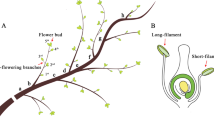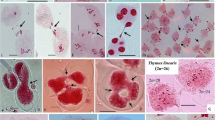Abstract.
To understand the reproductive biology of Cupressus dupreziana A. Camus (Cupressaceae), a highly endangered Mediterranean conifer, the processes of microsporogenesis and pollen differentiation were investigated cytologically. Pre-meiotic development proved to be similar to the coniferous pattern: the microsporangia differentiated sporogenous tissue in which microsporocytes separated and underwent meiosis. As the meiotic steps proceeded, unexpected irregularities were observed concerning chromosomal and nuclear behaviour. This mainly included: abnormal chromosome segregation and cytokinesis, and nuclear fusion of the meiotic products. The result was the formation, in the same microsporangium, of heterogeneous microspore populations arranged in monads, dyads, triads, tetrads, and polyads, and cytoplasts giving rise to pollen grains of different sizes. This indicates that in C. dupreziana both abortive and unreduced pollen grains are generated. The significance of the finding is discussed in relation to reproductive biology and vulnerability to extinction .
Similar content being viewed by others
Author information
Authors and Affiliations
Additional information
Electronic Publication
Rights and permissions
About this article
Cite this article
El Maâtaoui, M., Pichot, C. Microsporogenesis in the endangered species Cupressus dupreziana A. Camus: evidence for meiotic defects yielding unreduced and abortive pollen. Planta 213, 543–549 (2001). https://doi.org/10.1007/s004250100531
Received:
Accepted:
Issue Date:
DOI: https://doi.org/10.1007/s004250100531




